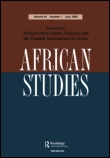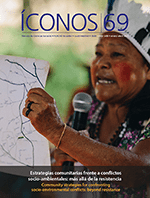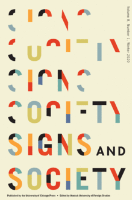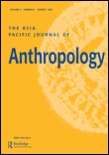
DIALECTICAL ANTHROPOLOGY
Scope & Guideline
Exploring the Intersections of Culture, Society, and Politics
Introduction
Aims and Scopes
- Social Reproduction and Labor:
The journal explores the dynamics of social reproduction within various contexts, particularly how labor practices intersect with familial and societal structures. This includes examining the roles of gender, migration, and economic conditions in shaping labor experiences. - Imperialism and Capitalism:
A core theme involves the critique of imperialism and capitalism, analyzing their impacts on social relations and cultural identities. The journal aims to understand the historical and contemporary mechanisms of power and exploitation. - Identity Politics and Social Justice:
Research often addresses the complexities of identity politics, focusing on how issues of race, gender, and class interact in the pursuit of social justice. This includes critiques of dominant narratives and the exploration of marginalized voices. - Activism and Resistance:
DIALECTICAL ANTHROPOLOGY publishes studies on various forms of activism and resistance, particularly in postcolonial contexts. The journal is interested in how social movements challenge existing power structures and create alternative narratives. - Ethnographic Methodologies:
The journal emphasizes ethnographic research methods, advocating for a nuanced understanding of cultural practices and social phenomena through immersive fieldwork and reflexive analysis.
Trending and Emerging
- Migration and Social Reproduction:
Recent publications highlight the interplay between migration, labor, and social reproduction, emphasizing how migrant experiences reshape familial and social structures. This theme is particularly relevant in the context of global displacement and economic precarity. - Digital Ethnography and Technological Impact:
There is an increasing focus on the implications of digital technologies on social practices and cultural production. The journal is exploring how digital platforms influence labor, activism, and identity, marking a significant shift towards contemporary ethnographic inquiries. - Postcolonial Critiques and Decolonial Approaches:
A notable trend is the emphasis on postcolonial critiques and decolonial methodologies. Scholars are engaging with the legacies of colonialism and exploring alternative epistemologies, which is becoming a defining feature of contemporary anthropological research. - Environmental Justice and Capitalism:
Emerging themes around environmental justice, particularly in relation to capitalism and labor, are gaining traction. The journal explores how environmental issues intersect with social inequalities, highlighting the need for a critical examination of ecological crises. - Intersectionality in Activism:
The intersection of various identities within activism is becoming a prominent theme. Research is increasingly focused on how race, gender, class, and sexuality intersect to shape social movements, reflecting a broader understanding of social justice.
Declining or Waning
- Traditional Ethnographic Approaches:
There seems to be a gradual decline in the focus on traditional ethnographic approaches that do not incorporate broader socio-economic and political contexts. The journal is increasingly favoring studies that engage with contemporary issues through a critical lens rather than purely descriptive ethnography. - Eurocentric Perspectives:
There is a noticeable waning of Eurocentric perspectives that previously dominated anthropological discourse. The journal is shifting towards more inclusive frameworks that prioritize non-Western viewpoints and critiques of Western hegemony. - Static Models of Class Analysis:
Research that relies on static or overly simplistic models of class analysis appears less frequently. The journal is moving towards more dynamic understandings of class that consider fluidity and intersectionality, reflecting contemporary class struggles.
Similar Journals

AFRICAN STUDIES
Unveiling the Rich Tapestry of African ScholarshipAFRICAN STUDIES, published by Routledge Journals, Taylor & Francis Ltd, is a leading academic journal that has been at the forefront of African research since its inception in 1942. With an impressive convergence of interdisciplinary insights covering Anthropology, Cultural Studies, History, and Political Science, this journal serves as an essential resource for scholars and practitioners alike. It boasts a notable impact within its field, ranking in the Q1 quartile for Cultural Studies and History and achieving a commendable Q2 for Anthropology, and Political Science and International Relations according to the 2023 category quartiles. Researchers can benefit from the journal's rigorous peer-review process, which ensures high-quality and impactful research dissemination. While it is not an open-access journal, it offers various subscription options for accessing its wealth of scholarly articles. With a commitment to advancing understanding of African contexts and perspectives, AFRICAN STUDIES plays a crucial role in shaping contemporary debates and fostering intellectual engagement within the academic community.

Iconos
Championing Accessibility in Academic Research Since 1997Iconos is a distinguished academic journal published by FAC LATINOAMERICANA CIENCIAS SOCIALES-FLACSO in Ecuador, with an ISSN of 1390-1249 and an E-ISSN of 1390-8065. Since its inception in 1997, Iconos has proudly maintained an open-access policy, promoting accessibility and dissemination of critical research across various disciplines. With a strong focus on Anthropology, Gender Studies, and Social Sciences, this journal has achieved a commendable standing, being categorized in the Q2 quartile in 2023 across multiple categories in these fields. Notably, it ranks #199 in Anthropology and #91 in Gender Studies, placing it in the upper percentiles of academic publishing. The journal aims to foster interdisciplinary dialogue and to illuminate socio-cultural dynamics through rigorous scholarship. With its commitment to quality, research diversity, and social relevance, Iconos serves as an essential resource for researchers, professionals, and students alike, seeking to engage with contemporary social issues from a Latin American perspective.

Signs and Society
Exploring the Intersections of Signs and CultureSigns and Society is an acclaimed academic journal published by University of Chicago Press, specializing in the interdisciplinary exploration of semiotics, cultural representations, and communication practices. With an impressive ISSN of 2326-4489 and E-ISSN 2326-4497, this journal has established itself as a credible source of research and insight within its fields. It operates under a robust framework with a convergence of topics from 2015 to 2024, and has achieved notable rankings, including Q1 placements in Cultural Studies, Linguistics and Language, and Visual Arts and Performing Arts in 2023, elevating it to a leading status among its peers. The journal’s impact is reflected in its Scopus rankings, positioning it in high percentiles across diverse categories, making it a vital resource for scholars, practitioners, and students interested in the intricate relationships between signs, society, and culture. Although not an open access publication, Signs and Society remains essential for those seeking to deepen their understanding of communication dynamics and the multifaceted dimensions of cultural expression.

CRITIQUE OF ANTHROPOLOGY
Elevating Scholarly Dialogue in AnthropologyCRITIQUE OF ANTHROPOLOGY, published by SAGE PUBLICATIONS LTD, stands as a vital platform in the field of anthropology, contributing significantly to the discourse surrounding cultural practices and societal norms since its inception in 1974. Recognized for its scholarly rigor, this esteemed journal holds a Q2 category ranking in both Anthropology and Arts and Humanities as of 2023, with impressive standings in Scopus, including a rank of 55 out of 502 in Social Sciences and 107 out of 552 in Arts and Humanities. The journal's extensive scope—from theoretical critiques to empirical studies—facilitates a rich exchange of ideas among researchers, professionals, and students, thereby enriching the anthropology community. Although CRITIQUE OF ANTHROPOLOGY does not provide open access, its prestigious reputation and impact on the field make it an essential resource for those seeking to deepen their understanding of anthropological scholarship.

Asia Pacific Journal of Anthropology
Connecting Scholars to the Heart of Cultural StudiesAsia Pacific Journal of Anthropology is a premier academic journal dedicated to advancing the field of anthropology and cultural studies, published by Routledge Journals, Taylor & Francis Ltd. With an ISSN of 1444-2213 and E-ISSN 1740-9314, this journal has gained recognition for its rigorous scholarly contributions since its inception in 2000. Situated in the UK, it is strategically positioned to serve as a vital resource for researchers, professionals, and students exploring the rich complexities of human societies and cultures within the Asia Pacific region and beyond. As evidenced by its Q2 ranking in both anthropology and cultural studies for 2023, alongside its impressive Scopus ranks—#218 among 1304 in Cultural Studies and #157 among 502 in Anthropology—this journal illustrates a strong commitment to delivering high-quality, impactful research. While it is not an open-access journal, it remains a key platform for disseminating innovative research and fostering academic dialogue, thereby significantly contributing to the advancement of knowledge in the social sciences.

Economic Anthropology
Connecting Cultures to Economic RealitiesEconomic Anthropology, published by WILEY, is a leading journal dedicated to advancing the interdisciplinary understanding of economic practices through anthropological research. With an ISSN of 2330-4847, this journal navigates the intricate connections between economic systems and cultural contexts, providing a platform for both theoretical and empirical studies since its inception. As a testament to its scholarly impact, it holds a Q1 ranking in Anthropology and a Q2 ranking in Economics and Econometrics as of 2023, positioning it among the top journals in these fields. The journal ranks #86 out of 502 in Social Sciences for Anthropology and ranks #338 out of 716 in Economics, reflecting a significant percentile positioning of 82nd and 52nd respectively. Although the journal operates under a subscription model, its comprehensive scope and dedicated attention to emergent economic phenomena make it a vital resource for researchers, professionals, and students who seek to deepen their insights into the economic dimensions of human behavior and social structures. Join the community of scholars contributing to this dynamic field as you explore innovative perspectives on the intersection of culture and economy.

Capital and Class
Fostering Dialogue on Socio-Economic TransformationsCapital and Class is a leading academic journal published by SAGE Publications Inc., dedicated to advancing the fields of Economics, History, Sociology, and Political Science. Since its inception in 1977, this esteemed journal has provided a critical platform for innovative research that examines the complexities of economic structures and their socio-political ramifications. With a distinguished presence in the academic community, it holds impressive rankings, including Q2 in Economics and Econometrics and Q1 in both History and Sociology and Political Science as of 2023. Furthermore, it stands out in the Scopus Rankings, occupying the 98th percentile in History and the 78th percentile in Sociology and Political Science. The absence of Open Access options enhances its exclusivity, making it a vital resource for researchers and professionals seeking substantial scholarly contributions. As it prepares for its next era of scholarship until 2024, Capital and Class continues to illuminate the intricate relations between capital, class structures, and the dynamics of social change, fostering dialogue and discourse among scholars and practitioners alike.

LABOUR-LE TRAVAIL
Engaging Scholars in the Narrative of LaborI. LABOUR - LE TRAVAIL, published by the Canadian Committee on Labour History, is a leading journal that provides a critical forum for research in the fields of history and industrial relations. Launched in 1978, this scholarly publication has since established itself as a significant resource aiming to illuminate the complexities of labor history and its contemporary implications. With an ISSN of 0700-3862 and an E-ISSN of 1911-4842, the journal engages a diverse readership from Canada and beyond, promoting rigorous analysis and comprehensive discussions on labor movements, organizational behavior, and human resource management. Although it operates on a non-open access basis, its impact is indicated by its Q2 ranking in History and Q4 rankings in Industrial Relations and Organizational Behavior and Human Resource Management. Despite its modest Scopus standings, ranked 1466th in Arts and Humanities History and 59th in Industrial Relations, the journal remains committed to fostering scholarly dialogue and advancing research in these critical fields. With its editorial focus spanning decades, I. LABOUR - LE TRAVAIL serves as both a historical archive and a contemporary journal, encouraging contributions that critically engage with labor issues across various contexts.

Focaal-Journal of Global and Historical Anthropology
Advancing Interdisciplinary Dialogue in AnthropologyFocaal-Journal of Global and Historical Anthropology is an esteemed academic journal published by BERGHAHN JOURNALS, focusing on the intricacies of global and historical anthropology. With an impressive impact factor and positioned in the Q1 category of anthropology for 2023, this journal is recognized for its exceptional contributions to the field, ranking #121 out of 502 in the Social Sciences category on Scopus. Since its transition to Open Access in 2020, Focaal has made significant strides in democratizing academic knowledge, allowing broader accessibility for researchers, professionals, and students worldwide. The journal provides a platform for interdisciplinary dialogue and critical analysis, paving the way for innovative research and thought-provoking discussions. With a commitment to fostering a deeper understanding of anthropological practices and their global implications, Focaal is an essential resource for anyone engaged in contemporary anthropological studies.

Social Analysis
Unpacking the Dynamics of Human ExperienceSocial Analysis, an esteemed academic journal published by BERGHAHN JOURNALS, is at the forefront of interdisciplinary research, focusing on the dynamic intersections of anthropology, cultural studies, sociology, and the arts and humanities. Since its inception in 2002 and having transitioned to an Open Access model in 2020, the journal ensures that critical social research is widely accessible to scholars and the public alike. With an impressive Q1 ranking in Anthropology and cultural studies and holding a notable Q2 in Sociology and Political Science, it garners attention from a large academic audience, as evidenced by its high Scopus rankings: 10th in general arts and humanities and 153rd in cultural studies. This signifies its influential role in shaping contemporary discourse and providing a platform for innovative ideas and methodologies in understanding social phenomena. Based in Brooklyn, NY, the journal is dedicated to fostering scholarly dialogue and advancing the field, making it an essential resource for researchers, professionals, and students eager to engage with and contribute to the field of social analysis.